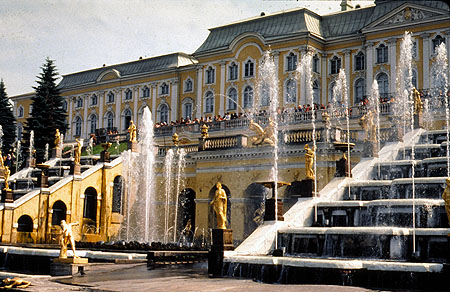HIS 112
Unit 2: Seventeenth-Century Europe

The Western facade
of Peterhof, Peter the Great's summer palace outside of St.
Petersburg, built between 1714 and 1725, overlooking the Gulf of
Finland. As you can see, Louis XIV, with his Château de Versailles, had
no monopoly on baroque elegance.
 What you must do in this unit
What you can do in this unit
What you must do in this unit
What you can do in this unit
- You may listen to some further information about
seventeenth-century Europe from my HIS 102 course. Even though the remarks were made for my Western civilization course, they are equally
applicable to this world civilization course.
- The website on The Glorious Revolution includes a chronology, encyclopedia of terms and quotations.
Some videos that you can watch for this unit
- See the videos dealing with the seventeenth century in the HIS 102 course.
- It's not really a video, but Civilisations is a kind of interactive timeline of world empires.
- For extra credit please suggest to your instructor a relevant video for this unit of the course. Send the title of the video, the url and a brief explanation of why you find the video interesting and applicable to the material that is being studied in this unit.
Extra Credit Options
- Take the short 5-point quiz(zes) for this unit's textbook chapter(s). Log into Blackboard and look under "Chapter Quizzes." You have five minutes to complete each quiz (multiple-choice questions).
- For 50 points maximum extra credit, write a one-page paper, What was
Louis XIV's conception of absolutism? Please be sure to cite your
sources.
- For 50 points maximum extra credit, compare and contrast the reigns of
Louis XIV and Peter the Great in a one-page paper. Please be sure to cite your
sources.
- For 25 points maximum extra credit, read the English Bill of Rights
and write a paragraph in which you examine, Was the English Bill of Rights a
democratic document? Note the earlier important political
document in England was the
Petition of Right (1628).
- For a possible 25 points extra credit, read the short excerpt (*.pdf file) from Utopia (1516) by Sir Thomas More (1478-1535) and comment about its relevance over the succeeding centuries.
- For 10 points maximum extra credit, answer the English Bill of Rights
study sheet
questions.
- For extra credit, please suggest a
relevant website for this unit of the course. Send the title of the site, the url and a
brief explanation why you find the information interesting and applicable to
the material being studied this unit.
|

